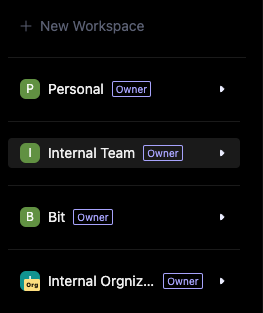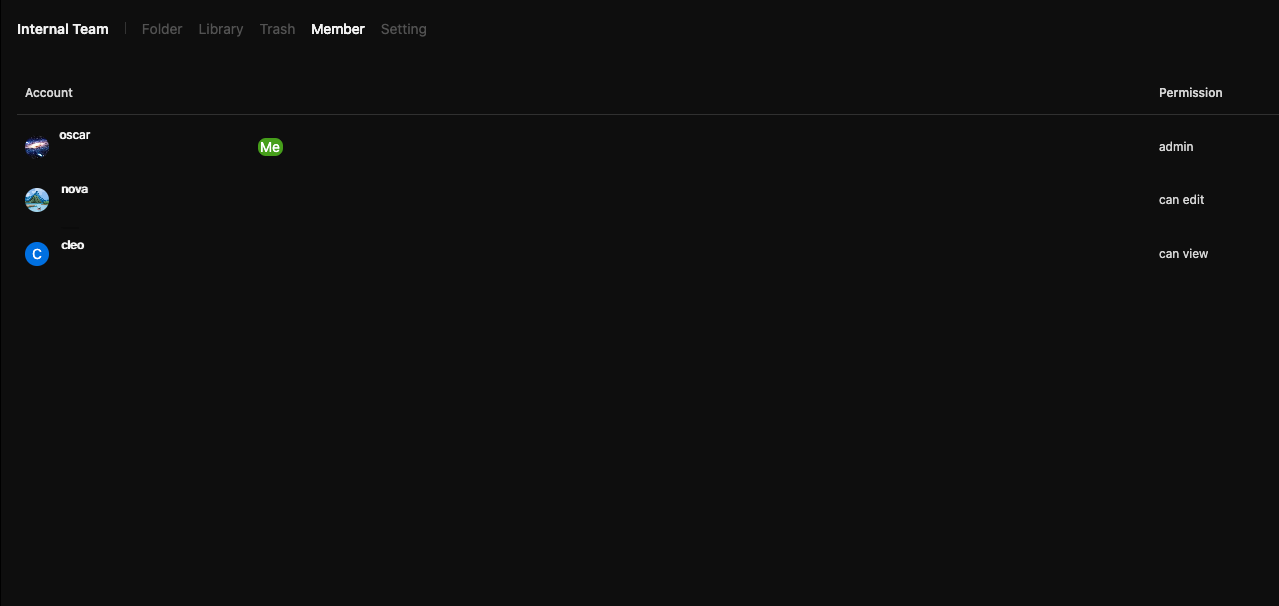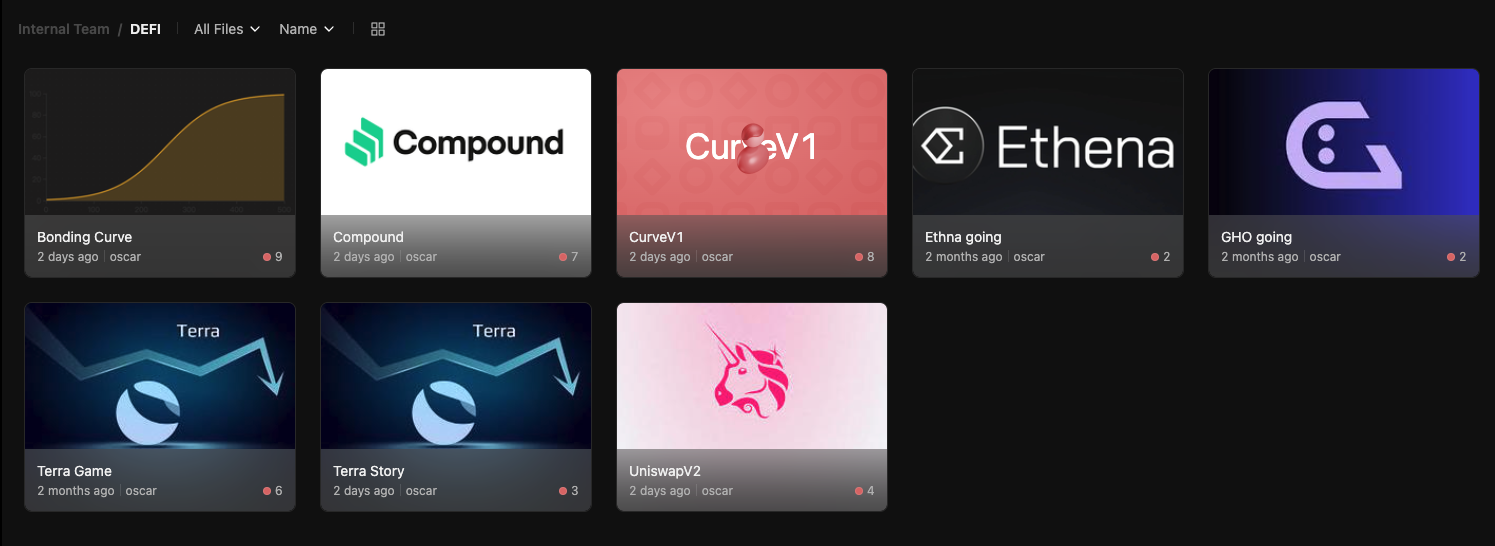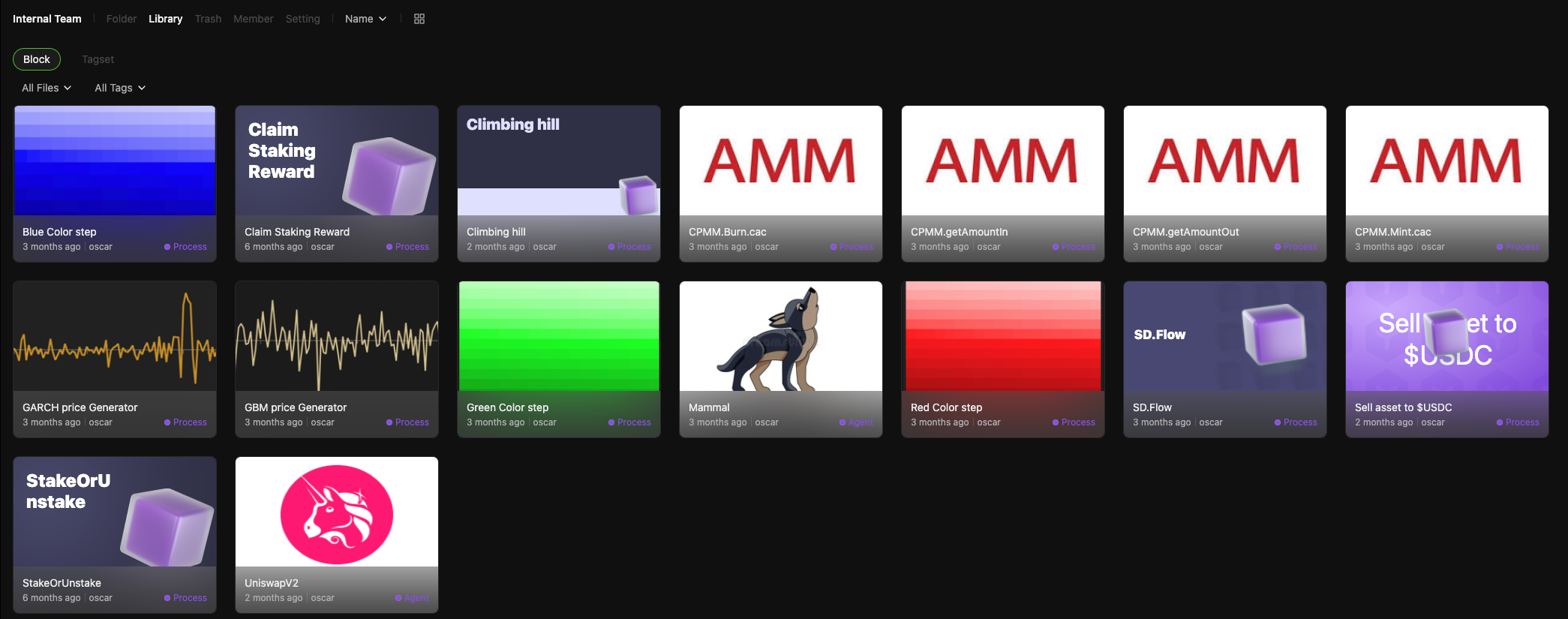Workspaces and Teams
Workspaces
Overview

The workspace on the HoloBit platform serves as the central hub for all research work, team collaboration, and library building.
- Asset storage: All created files and tag sets are saved in this workspace.
- Team collaboration: All team members collaborate on files within this workspace.
- Shared library: This workspace has its own blocks and global tag sets, which are used for system simulation.
Think of a workspace like a "factory." The team works inside it, and all "products" (model files, blocks, etc.) are stored there.
Ownership and Management Rights
- Workspace Owner: The user who creates a Workspace owns all files within it. This ownership cannot be transferred.
- Team Management: The workspace owner has exclusive administrative rights over the team and its collaboration settings. These rights cannot be transferred.
- Data Deletion: If a Workspace is deleted, all data within it (files, library items, etc.) will be permanently lost.
- Note for Free Plan Users: Files in workspaces under the free plan are not private and may be publicly accessible. For private collaboration and data security, please upgrade to a paid plan. Refer to our Pricing and Privacy Policy for full details.
Multiple Workspaces
- One or Multiple Workspaces: Users must have at least one Workspace. You can create and own multiple Workspaces, with the specific number allowed often depending on your subscription plan.
- Independence: Different workspaces are independent of each other. Content and members in one do not automatically affect another.
- Cross-workspace copying: The owner can grant collaborators permissions to copy Holo files and library assets between workspaces.
Teams
Each Workspace functions as a collaborative environment for a Team. The workspace owner can invite and manage members.

- Real-time Collaboration: Team members can work together in real-time on tasks like system simulation modeling and experiments within the shared Workspace.
- Resource Consumption: All consumption of resources (e.g., component quota, team seats) is billed to the workspace owner's subscription. Available features depend on the owner's subscription tier—regardless of the collaborators' personal subscription.
- Role-Based Permissions:
- Workspace owners manage the permission roles of each member within that specific Workspace.
- A member's default file permission in this workspace is derived from their team role, but fine-grained file-level permissions are also supported.
Think of team members as employees in a company. They use the workspace owner's resources (tools and equipment), and all consumption is billed to the owner's subscription plan.
File Sharing (Collaboration with External Users)
Beyond Workspace team collaboration, HoloBit supports sharing individual Holo Files with external users (those not part of the Workspace team).
- Per-file Invites: External users can be invited to collaborate on a single Holo file.
- Seat Limits: The number of external editor seats is capped by the subscription tier.
- Identical Workflow: External collaborators work in real time and are managed with the same role-based permission system as internal team members.
Holo Files and Scenarios
Files

Holo files are the fundamental units for organizing research content on the HoloBit platform. They are stored in folders for better organization.
-
Real-time Autosave: All edits made to Holo Files are automatically saved by the system in real-time. For more information, refer to the Files and Library chapter.
-
Multiple Scenarios: Each Holo file can contain multiple scenarios, allowing users to structure their research effectively.

Scenarios
A Scenario represents a specific version or configuration of a model or an experiment.
Types of Scenarios:
- Model Scenario: Used for system simulation modeling. These are self-contained and can be run independently.
- Experiment Scenario: Designed for running tests (e.g., parameter optimization, reinforcement learning) based on a Model Scenario.
- An Experiment Scenario must be based on an existing Model Scenario.
- A single Model Scenario can be the foundation for multiple, distinct Experiment Scenarios. One Experiment Scenario is linked to only one Model Scenario.
- The overall number of files and the complexity (e.g., component count) of individual scenarios you can create may be subject to limits based on your subscription plan.
For example, you can create a Holo file to study the Terra protocol:
- Scenario 1: A base model that reproduces the core mechanics of the protocol.
- Scenario 2: A reinforcement-learning experiment based on Scenario 1, training an agent to attack the protocol and reveal potential vulnerabilities.
- Scenario 3: If Scenario 2 succeeds, an optimization experiment (again based on Scenario 1) that estimates the minimum attack cost under assumed conditions.
- Scenario 4: A revised model with the vulnerabilities fixed, ready for retesting.
Folders

- Holo Files are organized and stored within Folders inside a Workspace. To create a new model or experiment file, first select an existing folder or create a new one in your workspace.
- You can create multiple folders in a workspace to categorize your files. For details, see the Interface Guide chapter.
Typically, you might create a folder to hold all files related to a specific research project.
Community
The Community is HoloBit's public ecosystem for users to share and explore. Key functional modules within the Community include the Marketplace.
- Independence of Published Files: Files published by users to the Community (e.g., via Marketplace) are related to but independent copies of their original files within their private Workspaces.
Marketplace
HoloBit's Marketplace lets users browse, acquire Holo files and block files into their own workspaces.
- Publish Files: Users can publish Holo files or block files to Marketplace for community to explore.
- Browse and Acquire: Users can download, favorite, like, and comment on items available in Marketplace.
Library
The workspace library stores block files and global tag sets related to system simulation.

Blocks
- In HoloBit system simulation, Blocks are user-defined, reusable components that make modeling easier and more modular. They can represent custom Entities or Processes.
- Block definitions are stored as block files in the library.
Global Tag Sets

- A Tag Set in system simulation is a predefined list of enumerated values (tags).
- Global tag sets are stored at the workspace level, acting as shared templates you can directly load in new models—saving you from re-creating the same enumerations every time.
- They can be edited in the workspace library or via certain modeling operations that "push" updates back to the global tag set.